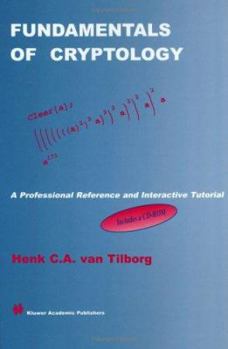Fundamentals of Cryptology: A Professional Reference and Interactive Tutorial
The protection of sensitive information against unauthorized access or fraudulent changes has been of prime concern throughout the centuries. Modern communication techniques, using computers connected through networks, make all data even more vulnerable for these threats. Also, new issues have come up that were not relevant before, e. g. how to add a (digital) signature to an electronic document in such a way that the signer can not deny later on that the document was signed by him/her. Cryptology addresses the above issues. It is at the foundation of all information security. The techniques employed to this end have become increasingly mathematical of nature. This book serves as an introduction to modern cryptographic methods. After a brief survey of classical cryptosystems, it concentrates on three main areas. First of all, stream ciphers and block ciphers are discussed. These systems have extremely fast implementations, but sender and receiver have to share a secret key. Public key cryptosystems (the second main area) make it possible to protect data without a prearranged key. Their security is based on intractable mathematical problems, like the factorization of large numbers. The remaining chapters cover a variety of topics, such as zero-knowledge proofs, secret sharing schemes and authentication codes. Two appendices explain all mathematical prerequisites in great detail. One is on elementary number theory (Euclid's Algorithm, the Chinese Remainder Theorem, quadratic residues, inversion formulas, and continued fractions). The other appendix gives a thorough introduction to finite fields and their algebraic structure.
Format:Hardcover
Language:English
ISBN:0792386752
ISBN13:9780792386759
Release Date:December 1999
Publisher:Springer
Length:492 Pages
Weight:2.83 lbs.
Dimensions:1.4" x 7.4" x 10.2"
Customer Reviews
0 rating





